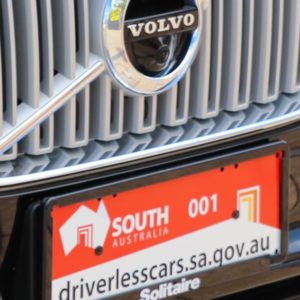
Flinders’ unmanned land and sea prototypes lined up with the modified Volvo XC90 car in CBD demonstrations of autonomous vehicle systems at an international conference in Adelaide this week.
The Volvo XC90 will become the first vehicle to go through on-road driverless car testing in the Southern Hemisphere at tomorrow’s historic demonstration trials on the Southern Expressway.
The demonstration will be held between 6am and 1pm on the Southern Expressway on Saturday 7 November. The road will be closed in both directions between Sherriffs Road, Lonsdale and South Road, Old Noarlunga.
As a scientific partner in the ARRB Australian Driverless Vehicle Initiative, Flinders is in pole position to add fuel to the future of autonomous vehicle production and use in South Australia.
Hundreds of delegates at this week’s Driverless Cars Conference heard about the future of an emerging global industry, with an exhibition including displays by Flinders University’s School of Computer Science, Engineering and Mathematics.
The fully equipped autonomous catamaran, built by the school’s Centre for Maritime Engineering, Control and Imaging, did a demonstration trial near the Adelaide Oval footbridge on Adelaide’s Riverbank Precinct. Centre director Associate Professor Karl Sammut said the autonomous vessel and University’s Husky unmanned vehicle were on show at the Torrens Parade Ground during the two-day conference.
“We’re equipping our unmanned catamaran for the advanced robotics RobotX international competition in Hawaii next year – and looking forward to expanding industry participation in this project,” Associate Professor Sammut said.
Head of Civil Engineering at Flinders Professor Rocco Zito has assisted with recent research into the environmental impacts of various transport policy initiatives, including the use of electric, solar and autonomous.
“Flinders University is looking at trialling an autonomous bus to link its Tonsley and Bedford Park campuses, which could also provide links to Flinders Medical Centre, Clovelly Park and Tonsley trains stations and Marion shopping centre,” Professor Zito said.
“The aim of this Adelaide trial and other trials should be to gain acceptance of these sorts of technologies.”
Professor Zito predicts the arrival of widespread uptake of autonomous vehicle features and vehicles in Australia in the next 10 to 20 years – “which is only a few vehicle model cycles”.
“By then we should see changes in laws, implementation of Cooperative Intelligent Transport Systems (C-ITS) technologies in cars and roads, and many more trials of autonomous vehicle features and vehicles.
“Autonomous vehicles trials are a good way of getting these vehicle accepted by the public.”
Premier Jay Weatherill told the conference that South Australia is well placed to tap into a global industry worth up to $90 billion by 2030.
“We are keen to forge partnerships and promote international connections with advanced automotive manufacturers and I am confident this conference will provide long-term benefits for our state,” he said at the conference opening.
Professor Zito’s summary of the future of driverless cars can be heard at a Scimex online briefing here and at The Conversation.

